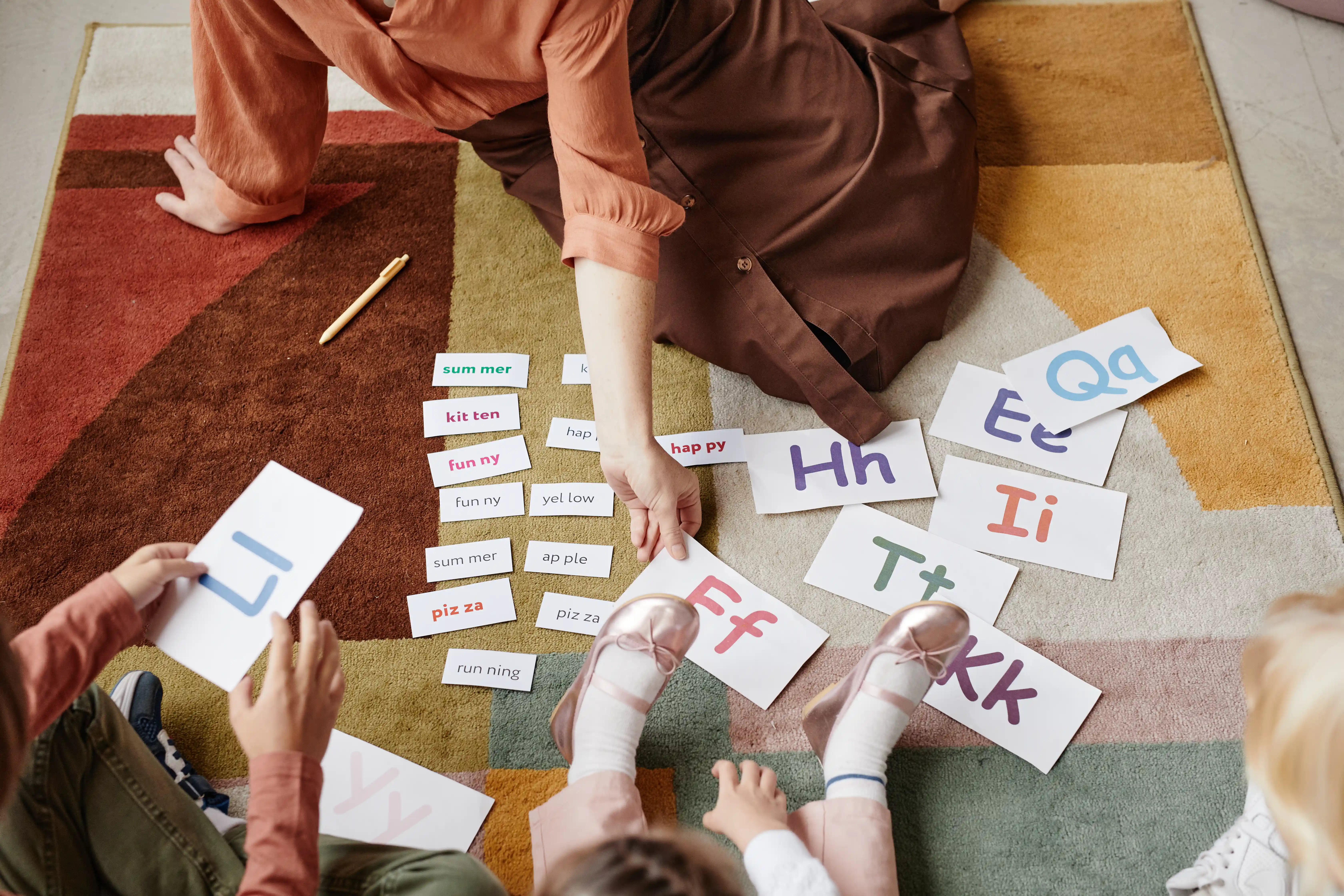Interactive Vocabulary Games: Turning Language Learning into Playtime
Vocabulary games support stronger language skills through playful practice. These activities help kids learn new words, understand meaning in context, and use language more clearly in speaking and writing.

Vocabulary games to strengthen kids’ language skills
Memorizing new words is an integral part of growth. When you can turn this process into a fun and enjoyable activity, it simplifies everything for you and your child. In today’s article, we’ve gathered the best vocabulary games for kids of different ages, suitable for various settings and circumstances.
The Importance of Vocabulary Games for Kids
Some people still believe that learning is no laughing matter and there is no place for fun if you want to comprehend some serious topics. And it might be true to some extent. However, when it comes to kids, the best way to draw their attention is to make this process as pleasant as possible. That’s when fun vocabulary games step in.
Such simple, at first glance, activities have plenty of advantages. They’re not only a valuable addition to an educational process. They can also have a significant impact on social skills and cognitive development. But how to choose the best games? And what options are available? Don’t worry! We’ve compiled a list of the best ones and are happy to share it with you.

Help your child
grow with Keiki
We’ll help you turn everyday screen time into real learning progress.
Try KeikiIndoor Vocabulary Games for Kids
One of the best things about vocabulary-learning activities is that you can do them almost everywhere. Most games can be seamlessly adapted for various scenarios, making it easier for you to keep your little ones engaged anywhere and anytime. Here are some of the best games for vocabulary practice indoors.
1. Guess the Word
Starting strong with one of our favorites. Have you ever heard about the “Who am I?” game? This one is almost the same, but instead of real characters, participants need to guess the hidden word. Preparation for the game is simple. You only need Post-its or any other sticky cards and some writing supplies.
When everything’s ready, just take your cards and write down the words you’re currently learning with the kids; they can be related to a specific topic. When your Post-its are ready, you can start playing immediately. Make sure your little ones can’t read the word written on their Post-it – the best option is to put them on their foreheads immediately or play one-by-one. Now, all that remains is for the children to ask questions about their assigned words and try to guess what’s written on the cards.
2. Memory Cards
This kindergarten vocabulary game is also a variation of another well-known activity. The preparation is simple – you only need to prepare or purchase memory cards with the words. Now, kids need to match the word written on the card with its meaning, just like they would do with two identical cards in the original version of the game.
3. Explain This! Lightning Rounds
This one is the opposite of the “Guess the Word” game. Here, participants need to explain a given term without using the word itself or any of its derivatives. You can divide kids into two or more groups, depending on the number of participants. And to make it more challenging and fun, don’t forget to set the time limit!
4. Vocabulary Jeopardy
Here, the name speaks for itself. It is the vocabulary variation of the well-known game created by Merv Griffin. We’ve made a quick and simple instruction to help you prepare everything:
- Draw a table. You can do it on the whiteboard, a blackboard, or any other convenient place that will be visible for all kids.
- Make rows with different categories and columns with points given for each answer.
- Tape word cards on the board facing down.
- Divide your little ones into two or more groups.
And you’re all set! Now, kids need to choose the category and the number of points they want to receive. After that, they take a word, and they should either define it, or do any other actions (e.g., find a synonym, spell it out, etc.). Every correct answer brings the team points, and the ones with the highest score win.
5. Vocabulary Dice Game
If you want to make your activity not only educational but also a bit thrilling, this one is definitely for you. To play it, you need a dice (two or more, depending on the number of participants) and word cards. Once again, it’s better to divide kids into groups. One by one, children roll the dice and draw a word card from the stack. Then, they should either define a given term or guess the word by definition. And here’s the element of luck – the number of points they receive solely depends on the number they get on the rolled dice.

Outdoor Vocab Games for Active Learning
As you can see, there are plenty of fun things you can do with children indoors. However, outdoor activities are essential for young children. And luckily, there are numerous ways to combine them with vocabulary-learning games! Here are some ideas.
6. Word Hunt
Turn boring studying into a thrilling quest! This one is a Scavenger Hunt variation, and there are multiple ways you can play it. The main goal is the same – to find and collect particular objects given to the player at the beginning of the game. To make it more vocabulary-related, you can:
- give kids a list of words and hide the corresponding objects within the designated area;
- to make the game more challenging, use word definitions instead of the terms, preserving the same goal;
- hide word cards within the area, and ask the participants to collect as many as they can. After that, they should define their words – the more they can do it, the more points they receive.
And that’s just a few examples! You can change the rules according to your needs. Just don’t forget to keep the main goal of the game.
7. Alphabet Relay Race
This one is great if you want kids to learn and spend their energy on some physical activities. Once again, this is one of those vocabulary word games that require two or more teams. Set up a relay race where players must run to a designated spot, pick a letter, and come back to their team to create words starting with that letter.
8. Word Toss
And here’s another fun and dynamic game for your little ones. To play it, you need some word cards and a beanbag or a little ball. Place the cards down on the ground, facing up. One by one, kids need to gently throw a beanbag to make it land on one of the words. Setting the goal is up to you – it might be to define, spell the term, or even find the synonym.
9. Vocabulary Hopscotch
Once again, the name speaks for itself. It’s a variation of a regular hopscotch game, but instead of numbers, you use words or letters. Players hop through the grid, reading, spelling out, or defining words as they go.
10. Sidewalk Chalk Words
Many kids like sidewalk chalk activities, and you can use them to your advantage, implementing a small part of learning into them. There are countless options – from writing down the alphabet to spelling out different words. The choice is up to you!
Online Vocabulary Games for Interactive Learning
It’s difficult to deny the impact the Internet has on our society. Though some people believe that online activities are damaging for kids, we think that using them properly can be advantageous. Here are some online vocabulary practice games that will be useful for your kid’s learning.
11. Word Search Puzzles
The goal here is pretty simple – to find and encircle the words hidden in the grid. It is not only fun but also useful, allowing kids to master vocabulary recognition, spelling, and even some practical skills, like attention to details.
12. Crossword Puzzles
There are countless variations of such games online, so you can easily find age-appropriate options for your little ones. The goal of crossword puzzles is simple – to fill in the blanks based on clues provided.
13. Word Sorting Games
This category is one of our favorites. The point of such games is to sort given words into different sections. There are also countless variations – dividing the terms by parts of speech, definition, etc. It is a great way to practice new terms, boost comprehension, and master critical thinking.
14. Vocabulary Hangman
The last one for today is classics. Like with a traditional game, the point is to guess letters to form a word before the entire hangman is drawn. The main goal is to find out the correct word before running out of attempts.
Help your child thrive with playful learning
Turn screen time into real growth with Keiki’s educational games.
Try KeikiEducational Value of Vocabulary Games
You can choose the best options from our list of games to learn vocabulary. But to make the most out of them, you also need to understand how valuable such activities are. How? Let’s find out together!
- Building Word Recognition
When you regularly expose kids to new vocabulary, it impacts their ability to recognize new words. But when doing it in a fun and engaging context, like by using one of those games, this process becomes even smoother.
- Enhancing Spelling Skills
Spelling-focused games significantly help to master this skill, allowing children to understand and memorize the correct spelling of words by highlighting different sounds of letters and letter combinations.
- Improving Sentence Construction
Some activities, mostlythose for kids agedf six and higher, are focused specifically on building sentences. They help your little ones practice and understand grammar rules, essential for mastering reading, speaking, and writing skills.
Cognitive and Social Benefits of Vocabulary Games
Learning new words is an essential skill. Yet, when it comes to little kids, there are many other important things they need to master since childhood. And you might be surprised, but vocabulary games can help with that, too!
- Enhancing Memory and Concentration
These are one of the fundamental cognitive functions that start to develop at a young age. By playing different vocabulary games, kids recognize and recall words, which strengthens their memory and helps practice sustained attention and concentration.
- Encouraging Social Interaction
Many of the games in our list require working in teams or pairs. As a result, kids learn to cooperate and communicate, which is a great way to find new friends or simply get to know new people.
- Promoting Problem-Solving Abilities
Vocabulary games often require children to think critically about word meanings, spelling, and usage, enhancing their problem-solving skills, which are undeniably important at any age.
- Boosting Confidence and Motivation
At first glance, these two simple factors play a crucial role in a child’s willingness to learn and take on new challenges. And in some cases, successfully playing simple word games gives a kid a sense of accomplishment, boosting their self-esteem and motivating them to achieve new milestones.

Help your child
grow with Keiki
We’ll help you turn everyday screen time
into real learning progress.
Explore the Best Vocabulary Learning Games with Keiki World
Access to different tools can make learning much more pleasant and easy for your child. That’s why you can’t miss out on the Keiki World application! Within the app, you’ll find numerous resources designed specifically for kids’ development. Here’s what you can access:
- Game-based learning content. Allow your kids to learn by playing! There are numerous mini-games available within the app, created to teach your little ones the essential skills in a playful manner.
- Worksheets. You can also find numerous materials for parents that can help you navigate through offline learning, preparing your kid for school, and much more.
- Progress tracking. In addition to learning materials, you can also monitor your little one’s advancement within the application!
The Keiki World app can be a great addition to your kids’ pre-k preparation. You can combine these materials with the child’s main learning process, making it more engaging, fun, and diverse.
Conclusion
Sometimes, something as simple as playing “Guess the Word” or hopping on the vocabulary hopscotch can significantly impact your child’s learning. So don’t underestimate these fun and useful games, and don’t forget to implement them in your little one’s daily activities. We hope that you’ll find some suitable options in this article!





